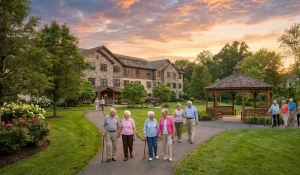I want to tell you something that might surprise you: skilled nursing care isn’t just for the elderly. Whether you’re bouncing back after surgery, handling a chronic condition, or adapting to life with a disability – this offers continuous healthcare support anytime you need it.
Honestly, so many people and their loved ones rely heavily on skilled nursing care – it’s pretty much a game-changer. But here’s the thing: it can also be incredibly overwhelming to navigate, especially if you’re new to the world of long-term care.
That’s where I come in. As someone who’s been through the process of finding skilled nursing care for a loved one, I know firsthand how challenging and confusing it can be. I’m convinced that the right tips and a bit of direction can help you pick the absolute best path for your loved one’s health.
Table of Contents:
- What Is Skilled Nursing Care?
- Who Needs Skilled Nursing Care?
- Services Offered in Skilled Nursing Facilities
- Choosing the Right Skilled Nursing Facility
- What to Expect During a Stay in a Skilled Nursing Facility
- Conclusion
What Is Skilled Nursing Care?
When it comes to caring for a loved one, the options can feel overwhelming. Assisted living, nursing homes, skilled nursing facilities – what’s the difference? As someone who’s helped countless families navigate these decisions, I know firsthand how confusing it can be. So let’s break it down, starting with skilled nursing care.
Definition of Skilled Nursing Care
Skilled nursing care is a high level of medical care that can only be provided by licensed health professionals like registered nurses, physical therapists, and speech pathologists. It’s more specialized than the care you’d receive in an assisted living facility. Skilled nursing is typically offered in a nursing facility or through a home health agency.
Types of Services Provided in Skilled Nursing Care
So what exactly does skilled nursing entail? Services may include:
- Wound care
- Intravenous (IV) therapy
- Injections
- Monitoring vital signs and medical equipment
- Rehabilitation services like physical therapy and speech therapy
These services require the expertise of trained medical professionals to ensure proper healing and recovery.
Difference Between Skilled Nursing and Assisted Living
While both skilled nursing facilities and assisted living communities offer care for seniors, they serve different needs. Assisted living is ideal for those who need help with daily tasks but don’t require round-the-clock medical care. Residents may receive assistance with activities like dressing, bathing, and medication management. In contrast, skilled nursing is for those with more complex medical needs who require frequent skilled services. Patients often transition to a skilled nursing facility after a hospital stay before they’re ready to return home. The decision between assisted living and skilled nursing ultimately depends on the level of care your loved one needs.
Who Needs Skilled Nursing Care?
So how do you know if skilled nursing is right for your family member? Here are some common scenarios:
Common Medical Conditions Requiring Skilled Nursing Care
Certain health conditions may require the intensive care and monitoring provided in a skilled nursing facility. These may include:
- Recovery after a stroke or heart attack
- Rehabilitation after surgery or injury
- Advanced wound care
- Respiratory conditions requiring ventilator care
- Serious infections requiring IV antibiotics
In these cases, 24/7 access to skilled nursing services is essential for recovery and stability.
Signs Your Loved One May Need Skilled Nursing Care
Even without a specific diagnosis, there are red flags that may indicate a need for skilled care:
- Frequent falls or mobility issues
- Difficulty managing medications
- Skin breakdown or slow-healing wounds
- Significant weight loss or lack of appetite
- Increased confusion or disorientation
If you notice these signs, it’s important to talk to your loved one’s doctor. They can assess the situation and determine the appropriate level of care. Making the decision to transition to skilled nursing is never easy. But for many family members, it’s the best way to ensure their loved one receives the care they need.
Services Offered in Skilled Nursing Facilities
Skilled nursing facilities offer a wide range of services to meet patients’ medical and personal needs. Let’s take a closer look.
Rehabilitation Services
One of the primary services in skilled nursing is rehabilitation. This may include:
- Physical therapy to improve strength, mobility, and balance
- Occupational therapy to regain daily living skills
- Speech therapy for communication or swallowing issues
The goal is to help patients regain maximum function and independence. Therapy is tailored to each individual’s needs and goals.
Medical Services
Skilled nursing facilities also provide a variety of medical services such as:
- Wound care
- IV therapy
- Pain management
- Respiratory care
- Catheter and ostomy care
Registered nurses and medical directors oversee patients’ care to manage health conditions and prevent complications.
Nursing Services
Of course, nursing care is at the heart of a skilled nursing facility. Nursing services are provided by a team of professionals:
- Registered nurses (RNs)
- Licensed practical nurses (LPNs)
- Licensed vocational nurses (LVNs)
- Certified nursing assistants (CNAs)
They monitor patients’ conditions, administer medications, and assist with daily needs. RNs also coordinate care plans and communicate with patients’ doctors.
Additional Support Services
Skilled nursing facilities offer additional services to support patients’ overall wellbeing:
- Social services to help patients and families cope with challenges
- Nutritional support from registered dietitians
- Activities and programs to promote social engagement
The interdisciplinary team works together to meet each patient’s physical, emotional, and psychosocial needs. When touring skilled nursing facilities for a loved one, don’t hesitate to ask for more details about their services. A quality facility will be happy to explain how they can meet your family member’s unique needs.
Choosing the Right Skilled Nursing Facility
Choosing a skilled nursing facility for a loved one is a big decision. You want a place that feels like home and provides top-notch care. Here are some factors to consider:
Factors to Consider When Selecting a Skilled Nursing Facility
Start by thinking about your loved one’s specific needs and preferences:
- Location – Is the facility close to family and friends?
- Specialty services – Does the facility have experience with your loved one’s condition (e.g. dementia care, ventilator support)?
- Cultural or religious considerations
- Activities and amenities
You should also consider the facility’s staffing levels, inspection reports, and ratings on Medicare’s Nursing Home Compare website.
Questions to Ask When Touring Skilled Nursing Facilities
When you tour a skilled nursing community, come prepared with questions such as:
- What is the staff-to-patient ratio?
- How do you handle medical emergencies?
- What is the discharge planning process?
- How do you involve patients and families in care planning?
- What activities and social events do you offer?
Don’t be afraid to ask tough questions. A good facility will be transparent and welcome your inquiries.
Understanding Financial Options for Skilled Nursing Care
Paying for skilled nursing care is a common concern. Fortunately, there are several options:
- Medicare – Covers up to 100 days of skilled nursing care after a qualifying hospital stay.
- Medicaid – Provides coverage for low-income individuals who meet eligibility requirements.
- Long-term care insurance – Policies vary, but some cover skilled nursing stays.
- Veterans benefits – VA benefits may cover skilled nursing care for eligible veterans.
The admissions team at the skilled nursing facility can help you navigate your financial options and understand what’s covered. Choosing a skilled nursing facility is a process, but don’t rush it. Take time to research, ask questions, and trust your instincts. With the right support, your loved one can thrive.
What to Expect During a Stay in a Skilled Nursing Facility
Transitioning to a skilled nursing facility can be overwhelming for patients and families. Knowing what to expect can help ease anxiety. Here’s a look at the process:
Admission Process
Admission typically starts with a referral from a hospital or doctor. The skilled nursing facility will assess the patient’s needs to ensure they can provide the necessary care. Paperwork will include consent forms, insurance information, and medical history. The admissions team will also discuss financial arrangements and policies. On the day of admission, a nurse will conduct a full assessment and orient the patient to their room and the facility.
Developing a Personalized Care Plan
One of the first steps is developing a personalized care plan. The interdisciplinary team – including doctors, nurses, therapists, and social workers – will meet with the patient and family to discuss goals and preferences. The care plan will address:
- Medical needs and treatments
- Rehabilitation goals
- Dietary needs
- Activity preferences
- Psychosocial needs
- Discharge planning
The care plan is a living document that will be updated as the patient’s needs change. The team will involve the patient and family in decisions and keep them informed every step of the way.
Daily Life in a Skilled Nursing Facility
A typical day in a skilled nursing facility revolves around the patient’s care plan. It may include:
- Therapy sessions
- Meals
- Medication administration
- Nursing care (e.g. wound care, monitoring vital signs)
- Activities (e.g. music therapy, pet visits, games)
- Family visits
The skilled nursing staff is available 24/7 to provide care and support. They’ll help with daily living activities, manage medical equipment, and ensure the patient is comfortable.
Discharge Planning
Discharge planning starts on day one. The goal is to help the patient transition to the next level of care, whether that’s home with home health services or a long-term care facility. The case manager or social worker will:
- Coordinate with the patient’s doctor and insurance company
- Arrange for necessary equipment and services
- Provide education and training to the patient and caregivers
- Connect the patient with community resources
Successful discharge planning involves open communication and collaboration among the patient, family, and care team. A stay in a skilled nursing facility can be challenging, but it can also be a time of healing and progress. By working closely with the care team and participating in the process, patients and families can make the most of their time in skilled nursing.
Key Takeaway:
Skilled nursing care is key for those with complex medical needs, offering everything from wound care to therapy. It’s different from assisted living because it provides round-the-clock medical help. Knowing when a loved one needs skilled care is crucial—look out for signs like frequent falls or confusion. Choosing the right facility means considering location, services, and how they involve you in care plans. Financial options include Medicare and Medicaid. Understanding what happens during a stay can ease worries—from admission to personalized care planning.
Conclusion
Skilled nursing care is a critical resource for those who need ongoing medical attention and support. Once you get a handle on what’s involved, whom it helps the most, and selecting just the right spot—rest assured knowing your loved one is in great hands.
Remember, it’s not just about finding a place with the right medical services and amenities. It’s about finding a community that feels like home, with compassionate staff who treat your family members with dignity and respect.
When you think about skilled nursing care, it’s way more than just health care. At its heart, we’re talking about ensuring that people close to us can seize every day fully and happily, even when facing tough times.
So don’t be afraid to ask questions, do your research, and advocate for your family member’s needs. With the right skilled nursing facility by your side, you can have peace of mind knowing that your loved one is in good hands.



